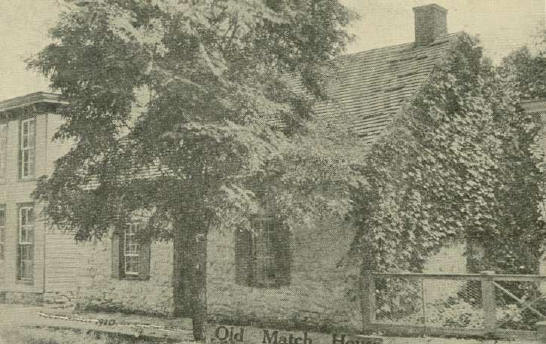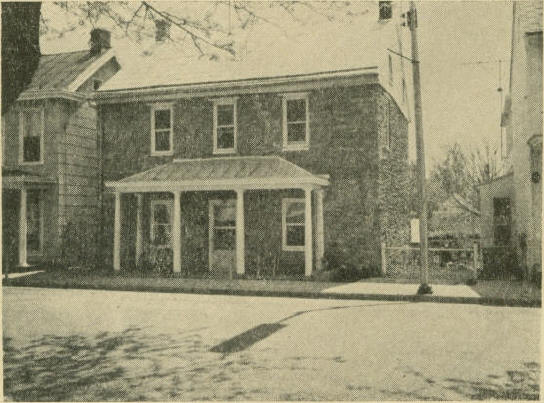|
Gateway to the Mountains
George Wireman
Chapter 8: The
Matchmaker of Mechanictown
In 1825, about seven
years before the town
was incorporated,
Mechanicstown scored a
"first" — not only for
the Colony of
Mary-land, but for the
whole New World. The
very first lucifer
matches ever
manufactured in
America were made in
Mechanicstown.
At this time the
community was one of
the State's most
flourishing industrial
communities. During
the latter years of
the Eighteenth Century
a remarkable company
of artisans and
craftsmen had drifted
into the isolated
section and, despite
its inaccessibility,
set them-selves up in
manufacturing.
Everywhere in the
colonies at this time,
fire was produced
solely by striking
steel against flint,
igniting a piece of
punk or other
in-flammable material
and blowing the spark
into a flame.
"Ignition matches" had
only recently been
introduced in the Old
World and a rare few
had found their way to
this continent.
The most prominent
folk were the Wellers,
who had a finger and a
dollar in nearly
everything that went
on in Mechanicstown.
Lusty men were the
Wellers, shrewd,
capable, farsighted
and quick to make use
of the riches nature
had lavished on their
lands.
It was on a visit to
Frederick in the early
1820's that Jacob
Weller found something
to challenge his sharp
curiosity. He
purchased some matches
which had been
imported from France.
Upon his return home
he showed them to his
brother Joseph and he
too became intrigued.
America never had
thought of anything as
unnatural as striking
fire from a bit of
wood daubed with a
queer looking mess of
chemicals. The flint
was giving a good and
trusty spark and this
new-fangled notion
from the Old World
evoked little
enthusiasm on the west
side of the Atlantic.
But to Jacob Weller it
was a mystery, modern
advancement, and utter
fascination. His
dabbling in science
and his remarkable
scientific library was
a fortunate prelude to
further adventures in
manufacturing.
Equipped with enough
scientific lore to
analyze the lucifers
and determine what
made them flame from
friction, Jacob
examined them very
closely, determined to
discover the closely
guarded secret of
their manufacture. He
had no trouble in
learning the secret,
and finally analyzed
the chemical
components of the
match heads. As a
result of his
discovery he was ready
to launch another
business — the
manufacture of
matches. And so
Mechanicstown got
America's first match
factory in the little
gray stone house that
had been for many
years his blacksmith
shop.
Having found how to
make the ignition
mixture, Jacob and his
brother Joseph began
experimenting to find
a practical form in
which to manufacture
them.
Finally Weller hit
upon the scheme of
using a solid cube of
soft wood which he cut
almost through into
two series of parallel
cuts, perpendicular to
each other. This made
a solid block from
which a nest of sticks
projected.
The matches were first
subdivided by hand and
later by machinery,
and then dipped into
the brimestone
mixture, etc., and
then set aside to dry.
The result was a
marketable block of
matches — from which
individual matches
could be broken off as
they were needed. The
matches were then
placed in boxes and
were peddled
throughout Frederick
County at twenty-five
cents a box. With each
box went a piece of
sand paper upon which
to ignite the matches.
Weller's new business
got under way in 1825
and historians of the
day had little to say
of the Match House and
what went on there.
Several writers list
match-making as one of
the community's claims
to fame. But one fact
remains undisputed.
The little gray stone
house still stands
today on West Main
Street, though
some-what changed from
its original form.
Fifty years ago every
stranger to the
community wanted to
see the little match
house, but time has
clouded the fame of
the building and now
even natives are apt
to forget that it was
here that the first
friction matches in
America were made.
Peddlers whom Jacob
Weller sent out to
market his
flame-producing bits
of wood, often
encountered vigorous
sales resistance,
often expressed by the
sharp teen of the
householder's dogs.
Many wild tales swept
through the
countryside. The
frontier folk warned
each other that these
new fire sticks would
explode and blow a
man, his family and
his earthly
possessions high into
the peaceful Mary-land
sky.
Did these wild stories
make the business too
poor to warrant its
continuance? Did the
itinerant merchants
grow tired of having
mongrels nip at their
heels and decline to
stock Weller's
distrusted lucifers?
Or was Jacob Weller,
perhaps, singed
physically as well as
financially, when, on
two occasions, the
enterprise was
destroyed by fire,
resulting from
spontaneous
combustion. What
brought an end to
Mechanicstown's match
production remains to
this day, one of
Frederick County's
most fascinating and
unsolved mysteries.

Match House in 1910
Through many
ownerships the Match
House stood almost
unchanged for decades
(perhaps for a
century, because its
construction date is
uncertain) until it
was purchased by a
Thurmont resident,
Rudolph O. Eyler. The
same substantial,
sturdy single storied,
peak-roofed little
house of Jacob
Weller's time, it
rested solidly on the
ground, having no
cellar beneath it. The
thick stone walls were
as sound as the day
they were mortared, so
Mr. Eyler ran them up
to a full two stories
— a move he somewhat
regretted later. What
a pity the building
was not kept in its
original size and
shape to preserve more
fully its authenticity
and remind generations
to come of the
colorful past of the
house and of its
erstwhile owner, Jacob
Weller.

The Match House as it
looks today
In the course of
modernization, Mr.
Eyler ripped up the
old single flooring so
a cellar could be dug,
and for a day workmen
delightedly sifted the
earth and came up with
handfuls of old
pennies and other
coins that must have
slipped from the
fingers of Weller's
customers and rolled
through chinks in the
floor.
Mr. Eyler also
installed a central
heating plant in the
new basement, as well
as modern plumbing and
lighting and made the
old Match House into a
comfortable eight-room
dwelling. There is
nothing to distinguish
it from neighboring
old-fashioned homes,
nothing to remind the
passing tourist of
those friction matches
which caused Jacob
Weller to become known
as the "Matchmaker of
Mechanicstown."
In 1938 the Match
House was used as a
cachet for the
celebration of
"National Air Mail
Week." Mr. Earl T.
Kelbaugh, then
Post-master of
Thurmont, was the
sponsor. As a result
of this action. many
travelers were
attracted to the
community, seeking a
glimpse of the very
first match factory in
America. Many even
took pictures, but
there were others who
were heard to remark
"What a pity it wasn't
kept in its original
form."
Today, the Match House
serves as the
residence of Mr. and
Mrs. Ralph Baltzell
who take pride in
telling strangers of
its historic past.
Chapter Index
| Chapter 9: Harriet Chapel
Read other articles by George Wireman
If you have any Information or
historical news clippings on events in
the Thurmont Area, Please send them to us so we can
included them in our archives. E-mail us at:
history@mythurmont.net |